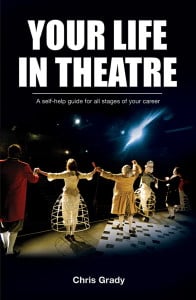
Book review: Your Life in Theatre
For those who are lost, in need of stimulation, guidance or inspiration, Jo Fletcher-Cross recommends Chris Grady’s ‘Your Life In Theatre’.
Billed as a “self-help guide for all stages of your career”, Chris Grady’s ‘Your Life In Theatre’ is a chatty and informative book drawing on years of experience working in the arts. Grady's own career has included senior roles at Theatre Royal Bury St Edmunds, the Pleasance Theatres in London and Edinburgh, Cameron Mackintosh Ltd, Buxton Opera House, Theatre by the Lake – the list goes on – and he uses the depth and breadth of his experience in one-on-one surgeries for creative artists, a mix of mentoring, coaching, consulting and listening. This book is essentially a distillation of ideas covered during these sessions.
Where he excels is in helping define clear targets and goals, and suggesting practical approaches that are directly applicable to arts professionals.
Grady structures the volume around Shakespeare’s ‘Seven Ages of Man’, explaining that those who attend his surgeries tend to fit generally into three types: aspiring/emerging – those in need of some very concrete pointers, contacts and next steps; inspired/overwhelmed – those searching for clarity, where to go next and how to balance time, life and work; and despairing/stuck – those looking for a new direction or wanting to be re-inspired. Those aspiring/emerging types take up around half of the book, which is no bad thing even for those further on in their careers – “we all benefit from a reminder of some of the basics,” as Grady says.
Back to the ‘As You Like It’ reference, those finding their feet in the arts may not be delighted at being described as “mewling and puking” but his advice is practical and sometimes so simple that you wonder why you didn’t think of it before. I had never made a database of theatres I have been to, been employed by or know someone who works there, or of artists I have admired or collaborated with. I have now. It is also refreshing to find someone who admits that you’re probably, at first anyway, going to need another job to pay the rent.
This section is packed with practical suggestions and exercises, encouraging the reader to explore what they already know and what it is they need to find out. Particularly strong is the excellent advice on marketing and his encouraging words on networking should coax even the most reluctant of hobnobbers out of the corner.
The long-serving creative soldier “seeking the bubble reputation”, opens the inspired/overwhelmed section. Here Grady draws on his own experience of being coached and training to coach others, and also working at board level. Time, treasure and talent are the key words. Where he excels is in helping define clear targets and goals, and suggesting practical approaches that are directly applicable to arts professionals. Management techniques that will most likely already be familiar to those working at this level are laid out in a beautifully simple fashion, which invites genuine thought and participation.
Moving on to those who might class themselves in the “justice” and the “wise saws” category (milking those seven ages of man for all they are worth), he gently rails against losing touch with modern potential audiences and also issues a rallying cry to the arts to create what he calls “necessary theatre” – connecting hearts and supporting humanity. “We have shining morning faces looking to be supported and inspired,” he reminds us. “We have to avoid the trap of looking back to a gentler time, of being angry and cynical.”
For the tired creative artist – the “slippered pantaloons” – there are inspiring words dedicated to finding the strength and reserve to keep making projects, with musings on open space technology, and passing on your own lessons and receiving energy from other creatives in return.
Dotted throughout the book are inspiring quotes – inevitably, according your taste, some more inspiring than others – from articles, minutes from open space encounters, plus a dozen or so excerpts from his blog. These, perhaps, are the weakest point. The nature of online writing often dates it faster than printed matter and this proves to be the case in several examples here, although they all contribute to the refreshing lack of formality throughout.
This is not a perfectly written book, but it is passionately delivered and full of vital information. For those who are lost, in need of stimulation, guidance or inspiration, I cannot recommend it highly enough.
Jo Fletcher-Cross is a playwright and journalist.
www.jofletchercross.co.uk
Join the Discussion
You must be logged in to post a comment.